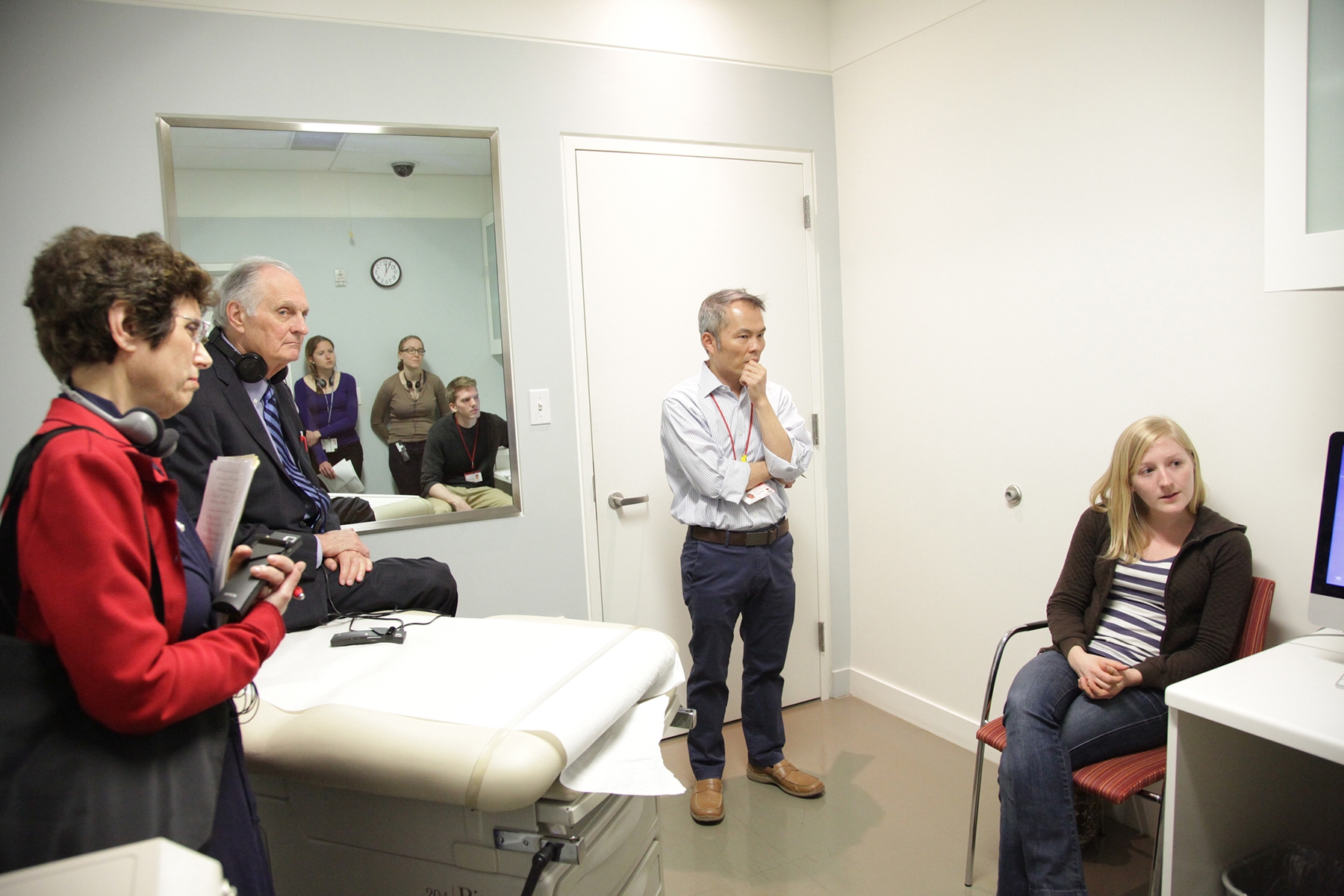Alan Alda is not a doctor, but he sure was convincing as one on T.V. So it's no surprise that after playing medic Hawkeye Pierce on "M*A*S*H*" and hosting PBS' "Scientific American Frontiers" for 12 years that the legendary actor has become a crusader for effective science communication.
It's a mission that Weill Cornell Medical College shares. Last month, Alda and a team from the Alan Alda Center for Communicating Science at Stony Brook University were on campus to observe a program that teaches third-year medical students effective communication through role-playing exercises. Their visit to the Oates Communication Skills Curriculum comes five months after Weill Cornell faculty observed Stony Brook's program, which trains scientists and health professionals to share their work in ways that are understandable to non-experts.
"What we want to do is create a collaboration between these two centers, which can become part of a network of centers that can trade the latest and most effective techniques so that the next generation will become very good communicators," said Alda, a visiting professor at the Alda Center.
Alda is convinced that physicians and scientists have compelling stories to tell, but the lexicon they use — replete with technical jargon — often erects an iron-clad barrier between them and the public. Good communication in science and medicine requires physicians and researchers to understand their audiences' needs by synthesizing complex concepts into easily digestible language. For doctors, that means understanding patients' stories and appreciating their perspectives on the effects of illness on their lives.

Bass, Alda and Dr. Jirasevijinda critique how students (left to right in mirror reflection) Krumdieck, Hamilton and Connors interacted with an actress, Carolyn McCandlish (right) hired to portray a patient with abdominal pain.
"It was always assumed that if you knew how to talk to people, you knew how to communicate effectively," said Dr. Kevin Kelly, director of the Oates Communication Skills Curriculum and a clinical professor of psychiatry and clinical professor of psychiatry in healthcare policy and research at Weill Cornell. "In recent years, officials at medical schools across the country and the world have appropriately begun to question that assumption. It's a crucial skill for practicing clinical medicine, and we need to cultivate techniques that work."
The Oates program — established in 2000 through a $1 million gift from the late Dr. James Oates III '55 — strives to do just that by teaching third-year medical students in the medicine and pediatric clerkships how to effectively communicate with colleagues, patients and their families through role-playing exercises. The program, housed in the Clinical Skills Center in the Weill Greenberg Center, hires actors to portray patients who are ill or in pain. In the session the Alda group attended, a 16-year-old girl had severe abdominal pain that was getting worse by the minute. The student doctors had to take a patient history, diagnose the problem, obtain a consult and treat the patient — all the while reassuring the teen and keeping her apprised about what was happening to her. The students received feedback on their encounter from program instructors, their fellow classmates and the actors.

Dr. Kevin Kelly, right, and resident Dr. Lindsay Edwards, left, give students (in the back left of the room) Metterle, left, and Haviland, right, feedback on how they interacted with actresses Emily Rosenthal (behind Dr. Kelly). Rosenthal portrayed a patient with abdominal pain, while Katie Tame (to her left), portrayed the patient's mom.
"What we hope to do is point out to students that they are using these skills all the time, and they could be using them more effectively if they were thinking about them," Dr. Kelly said. "If our students can get that message out of the session, then we have done our job."
By working to forge a formal collaboration between the two institutions, the Weill Cornell and Stony Brook teams are hoping to make one message clear: Learning effective communication skills is not something that can wait until aspiring doctors are in the field, completing their residencies or fellowships.
"The earlier you learn it the better," Alda said. "When speaking with a patient, you will often be talking to an untrained ear. You have to understand what they're going through as they listen to you. It's important to learn empathy, and it takes time to do that, but with practice the results can be extraordinary."

